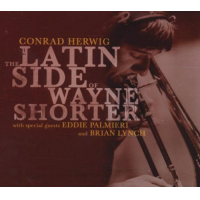Home » Jazz Articles » Interview » Nicholas Payton: Playing Strong and Playing Blue
Nicholas Payton: Playing Strong and Playing Blue
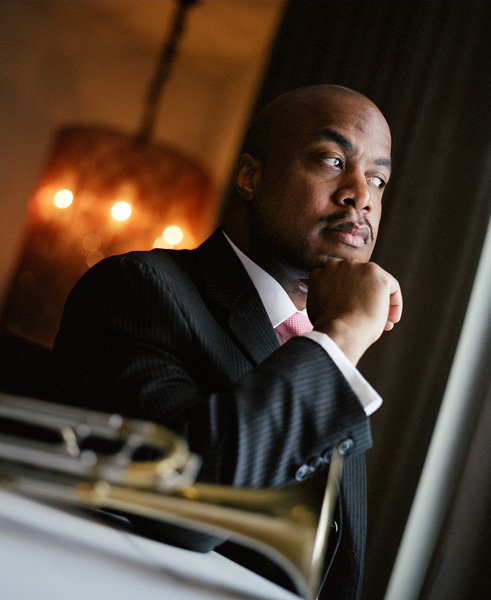 Trumpeter Nicholas Payton started out years ago as a musician known for being steeped in the traditions of his New Orleans origins. The "young lion" of about fifteen years ago had a brash, bold sound. He even produced a Louis Armstrong tribute—Dear Louis (Verve, 2001)—and did an album working with the classy Armstrong contemporary Doc Cheatham—Doc Cheatham & Nicholas Payton (Verve, 1997). But he continued to grow and explore other avenues, showing contemporary influences with the release of Sonic Trance for Warner Brothers records in 2003.
Trumpeter Nicholas Payton started out years ago as a musician known for being steeped in the traditions of his New Orleans origins. The "young lion" of about fifteen years ago had a brash, bold sound. He even produced a Louis Armstrong tribute—Dear Louis (Verve, 2001)—and did an album working with the classy Armstrong contemporary Doc Cheatham—Doc Cheatham & Nicholas Payton (Verve, 1997). But he continued to grow and explore other avenues, showing contemporary influences with the release of Sonic Trance for Warner Brothers records in 2003.While continuing to explore musical avenues, his playing got better and better, consistently placing him among the favorites in polls of fans and critics. Now, with the release of Into the Blue, on Warner's Nonesuch imprint, Payton says he is displaying various approaches in music that he enjoys. It's a solid disc of ten tunes, mostly from the pen of Payton. Even thought he admits going into the project with no specific direction in mind, Into the Blue emerges showing Payton as a thoughtful composer and a player who pays as much attention to his sound as his plentiful technique. It's a very solid album.
"Many of the tunes are very moody in the conception," he says, explaining the origin of the title. "Since blue and blues are synonymous with jazz and the overall feeling of what I was trying to capture with this record, more so than any particular genre or style, if you will. I was more or less trying to captivate a feeling of pensiveness, or melancholy; one of great music that is very simplistic and very beautiful at the same time. Blue is a color that is very representative of that kind of music."
He adds, "The record even changed conception from the moment I started working on it, as far as who was going to be on the record. Even the tunes. Many of the compositions I planned to be on the record didn't make it on the record. Many tunes that we actually performed and recorded that I thought would be on the record I let go over time, after listening to the material over and over again. It seemed like certain tunes just worked better for the flow of the record than other pieces. The concept of this record is really one of no concept at all. I went into the studio with no preconceived ideas of what I wanted to do other than just try to play music from the heart and hopefully give that feeling to the listener."
Based on that assessment, it's a grand success. It has moments of beautiful melancholy, and also upbeat swing. The sound of the horn is at the center and Payton's playing is inventive, not a chops exercise.
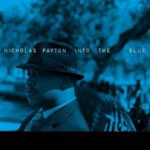 "I feel like on this record, I found a way to blend all these different things that I like to do. On one record, maybe I focused on one aspect, or one type of song more than another. [On the new disk] I found a way to more singular all the many different things that I love in music. It's an ongoing process. I feel like I'm getting closer and closer to finding a singular way to approach all the many things that I enjoy."
"I feel like on this record, I found a way to blend all these different things that I like to do. On one record, maybe I focused on one aspect, or one type of song more than another. [On the new disk] I found a way to more singular all the many different things that I love in music. It's an ongoing process. I feel like I'm getting closer and closer to finding a singular way to approach all the many things that I enjoy.""Drucilla," starts out with a haunting, melodic trumpet ballad where Payton's sound, not multi-notes, carries the day, before picking up the pace with thoughtful piano by Kevin Hays over the rhythms. Payton's solo uses space and pacing. "Let It Ride" is another melodic piece in the mainstream, sweet and mellow blowing over a faster, tight, rhythm. "Triptych" is more contemporary in its rhythm and melody line, and Payton negotiates with strong and thoughtful playing. Drummer is funky without being maudlin and as the pace heats up, so do drums and trumpet. "Nida" has a funky 'Nawlins sway that puts the trumpet in a similar buoyant mood. "Blue" finds Payton, with muted trumpet, floating over a slow ballad in a Milesian mood.
"Miles was one of my first inspirations on the trumpet, so his inspiration and influence are always a part of what I do to some degree. There are two great trumpeters—there were many—but two who I like to refer to as the Old Testament and the New Testament, Louis Armstrong and Miles Davis," says Payton. "They completely redefined the sound and the approach of the instrument; equally so, but in different ways. Their influence is inescapable. You can't play the trumpet and play jazz without summoning at least one of those two guys in some way or another. I think Miles said it best about Louis Armstrong when he said you can't play a note on the horn that Louis Armstrong hasn't played already. I think the same can be said for Miles, in a different way."
On "Blue," Payton also sings a lyric, slow and soft. The voice is something he has used before, and something he is incorporating more into his performances. He says the experience of singing helps him be more thoughtful when it comes formulating certain trumpet solos.
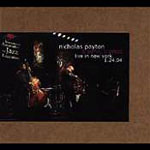 "It's something I've been doing a lot more recently. I had done it on a recording a few years back for the Armstrong project. I really didn't do it much after that. But the last couple years, I've been interested in doing it again. For one, there is a big tradition of trumpet players from my home town, New Orleans, singing. Everybody does it, with the exception of the more recent guys in the tradition; maybe from Terence [Blanchard] and Wynton [Marsalis] onward. But a lot of the older cats, all these guys sang as well as played, going back to Louis Armstrong. Clark Terry always would encourage me to do so.
"It's something I've been doing a lot more recently. I had done it on a recording a few years back for the Armstrong project. I really didn't do it much after that. But the last couple years, I've been interested in doing it again. For one, there is a big tradition of trumpet players from my home town, New Orleans, singing. Everybody does it, with the exception of the more recent guys in the tradition; maybe from Terence [Blanchard] and Wynton [Marsalis] onward. But a lot of the older cats, all these guys sang as well as played, going back to Louis Armstrong. Clark Terry always would encourage me to do so."It can be a very enhancing thing to your overall musicianship, but it can be a very frightening thing to do so. You're so exposed when you sing. It's your voice. Through the trumpet is one thing, but your actual voice. When you're singing it's so telling, so naked, to be able to do that, as an instrumentalist to try to bring that part to it. A lot of musicians are actually doing it. As a trumpeter, I think it has many benefits. Essentially, what we're trying to achieve when we play has a very lyrical quality. We're trying to make the trumpet sing, many of us. So to actually sing, and then to go put the horn to your face, it sort of re-enforces that type of feel, which you are trying to achieve on an instrument that can be a very unforgiving and difficult instrument to play. We're trying to make it as easy as possible. So when you put the trumpet up after you sing, it makes it easier to play, physically.
"The trumpeters that have the most longevity, in terms of a playing career, are usually the ones who sing. Look at guys like Doc Cheatham, Clark Terry, Sweets Edison. The cats that played the longest are usually the ones that sing as well as play. There's something to it."
 The band, particularly Kevin Hays on acoustic and electric piano, and drummer Marcus Gilmore (grandson of Roy Haynes), plays up to Payton's demands. It's his working band, for the most part; except that Hays has moved on to spur on his own career.
The band, particularly Kevin Hays on acoustic and electric piano, and drummer Marcus Gilmore (grandson of Roy Haynes), plays up to Payton's demands. It's his working band, for the most part; except that Hays has moved on to spur on his own career.Payton met the young Gilmore on the drummer's eighteenth birthday. He happened to be playing with his legendary grandfather at the Blue Note in New York City. Marcus was invited to sit in. "I was really blown away, it was so great. He had so much together then. We've been working together for the last two years-plus. I've watched him grow considerably from that point. He's continuing to do so. I expect we'll see a lot of great things coming from this young gentleman. He has an originality all his own but is very rooted and steeped in the tradition."
Another notable aspect to the project was working with noted producer Bob Belden. Payton normally produces his own albums, but happily gave Belden co-producing duties.
" Bob and I have had a friendship long before we got to work together. It was because of the rapport we have musically that I decided he would be a great choice as a producer ... Bob is very rare. He's a connoisseur of films, fashion, clothes, all sorts of things; things that are just as important, if not more important, than musicianship alone. I thought he was a perfect foil for me. We view things very similarly, but different enough so that he is a great objective counterpart."
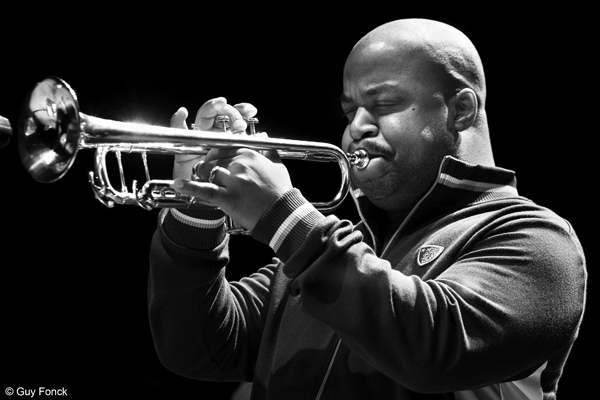
Composing is an important aspect of Payton's musicianship. He's still a sought-after sideman for many projects, but brings his own composing stamp to his own recording and performance. His writing frequency varies. Sometimes, with deadlines approaching, he will have to set aside specific time to write. "But even then I can't force that. Usually with those situations it can be planned a year in advance. Inspiration just doesn't come to me ... I can't summon it. It has to be present on its own accord. I have to be open to it whenever it's there. I have periods where I feel very prolific and other periods when nothing will come out. It's the same with improvising. I try to get my playing so that I only play the ideas that are really meaningful and don't play the things that I don't mean or that don't resonate with me.
" I don't try to theorize the improvisational aspect of my playing, no more so or less than my composition. At this point, I don't really want to do anything particularly special. I find there's more of a chance of it having meaning if these things flow out of the natural context of who you are and what feels right."
Payton, 35, seems to always have had a sense of what is right.
He was born into a musical family. His father, Walter, is a bassist and his mother played some piano and sang. Payton took up the trumpet at the age of four and by the age of nine he was alongside his father in the Young Tuxedo Brass Band. He says being around his father and other veteran musicians helped his growth immensely, and he played in other brass bands by the time he enrolled at the New Orleans Centre for Creative Arts, where he studied the trumpet, music theory and also undertook classical training. Early trumpet influences included Walter Brunious, a teacher at NOCCA, Miles, Clifford Brown, Armstrong. Over the years he would also be influenced by the music of John Coltrane and Wayne Shorter. Payton also attended the University of New Orleans where he studied with Ellis Marsalis, and while growing up heard and was affected by players like Wynton Marsalis and Terrence Blanchard from his home city.
By the age of fifteen he was on the road with pianist Marcus Roberts and had played with Clark Terry. In his twenties, his resume grew by playing with Jimmy Smith, Hank Jones and Milt Jackson. At eighteen, he began a two-year stint with drum legend Elvin Jones.
 Formal music education is important, and invaluable, he says, "but unless you've actually had a chance to really be with these guys who've been out here, and learn from them, then you're missing a goods part of what it takes to be a jazz musician."
Formal music education is important, and invaluable, he says, "but unless you've actually had a chance to really be with these guys who've been out here, and learn from them, then you're missing a goods part of what it takes to be a jazz musician."Payton has contributed to projects, and groups, of many jazz stars over the years, including Steve Wilson, Jesse Davis, Teresa Brewer, the Joe Henderson big band, Courtney Pine, Joshua Redman, Christian McBride, Roy Hargrove and Marsalis. In 1997, he received a Grammy Award for Best Instrumental Jazz Solo ("Stardust") for his playing on Doc Cheatham & Nicholas Payton (Polygram, 1997).
Payton tries to be thoughtful as a soloist, aware of his sound and knowledgeable that thunderous technique does not always win the day. Having grown up in the 1970s and 1980s, he's also aware of the influences of pother kinds of music. He tries to be faithful to jazz traditions and also open to follow other paths, something that fellow trumpeters like Christian Scott and Jeremy Pelt are also very keen to do these days.
"We as musicians of today have to negotiate in this great legacy we come from," he says. "When you talk about guys who have done so much with the music, like Thelonious Monk and Ornette Coleman, Dizzy Gillespie, Clifford Brown, Bill Evans, Chet Baker. All these guys that have done so much with the music. You're listening from that perspective and studying that perspective, yet you grow up listening to certain music, you go to school dances where you're part of what's happening now. I think the challenge for the younger musician is to learn from and understand what's come before, but not be bound to that as the only means of expressing what you have to say. That's the challenge for the young musician and I think that's what a lot of guys from the current generation are negotiating. What we love and what is considered jazz music. Only time will tell where this is going and how this will all pan out."
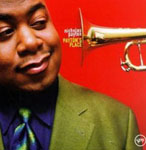 Payton says the level of opportunity for musicians is not the same as when he came onto the scene in the early 1990s, when major record labels had jazz divisions and musicians were getting recording contracts. With technology changing the game, and record labels having less and less influence, musicians are coping with new ways to make music and get it to the people.
Payton says the level of opportunity for musicians is not the same as when he came onto the scene in the early 1990s, when major record labels had jazz divisions and musicians were getting recording contracts. With technology changing the game, and record labels having less and less influence, musicians are coping with new ways to make music and get it to the people."Times have changed and we're going to have to change with them. Or else we're going to find ourselves in the cultural dark ages. Things change and the jazz musician of today has to figure out how to get there music heard and have a career. The amount of gigs, the amount of clubs are perhaps not what they were several years ago. The level of opportunities to record and have record deals is not the same; however it's much cheaper and much easier for musicians to record their own music. You can buy a Mbox and do a record inside your living room. So it's empowered the artist to be able to do their own music, have control of their own product. Everybody can put files on the Internet. You don't even have to have a physical disk anymore. You can cheaply disperse it and sell it and put it on MySpace for 99 cents apiece.
"We're still in this transitional mode where we don't exactly know how this is all going to settle in and we can take advantage of this new technology. That's what we're trying to figure out right now."
Payton is one of the musicians who have remained in the New Orleans area post-Katrina. Several moved on, never to return, and he doubts things will ever be the same in the Crescent City. But there are still opportunities to improve.
"A certain percentage of people found it difficult to stay, so they had to move. Things have gotten a little better, but it's not what it was and I'm not exactly sure it will ever be the same. I don't think so. There's an opportunity for it to be—though not the same—perhaps better. But certain things have to be done in order for it to do so, and it just doesn't seem the right steps are being made, the right types of provisions are being made for people to stay, if they want to, and for people who are still displaced to be able to come back. Quite frankly, a lot of people have better situations elsewhere than they have here.
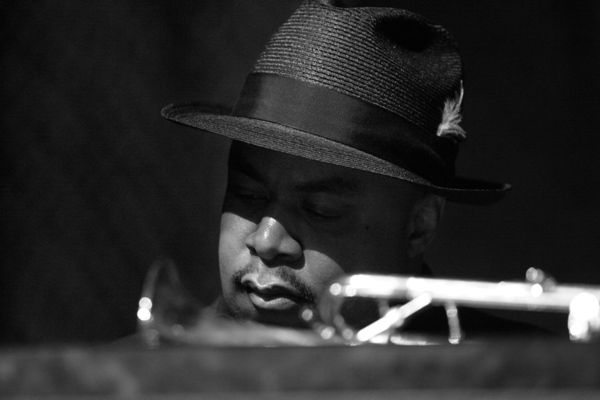
"This has affected not only the city, it's a reflection of this country and where our priorities need to be. But we have an opportunity here to do something positive and it's going to be up to us to see how this all pans out, not only for New Orleans, but for the country. It depends on the people's participation."
Meanwhile, Payton's reputation is strong and his performances always well received. He's busy for the year, touring in support of the new record. His schedule also includes a trip to Norway in the summer to participate in a special project with Maria Schneider. She will be doing arrangements for the Norwegian Wind Ensemble on the music from Miles Davis' and Gil Evans' Porgy and Bess (Legacy, 1958) project. Payton, who will also bring drummer Gilmore and a bassist, will, of course, provide the trumpet voice once laid down by Miles. No doubt, it will be done in Payton's own fashion. He has the style and the clarion tone to carry it off.
"I'm really looking forward to doing that. I've never worked with Maria before," says Payton.
Selected Discography
Nicholas Payton, Into the Blue (Nonesuch, 2008)
Joshua Redman Elastic Band, Momentum (Nonesuch, 2005)
John Ellis, One Foot in the Swamp (Hyena, 2005)
Nicholas Payton & Sonic Trance, Live in New York 1.24.04 (Kufala, 2004)
Greg Osby, Public (Blue Note, 2004)
Nicholas Payton, Sonic Trance (Warner Bros., 2003)
The Headhunters, Evolution Revolution (Basin Street, 2003)
Nicholas Payton, Dear Louis (Verve, 2001)
Nicholas Payton, Nick @ Night (Verve, 2000)
Ray Brown, Some of My Best Friends Are...The Trumpet Players (Telarc, 2000)
Abbey Lincoln, Wholly Earth (Polygram, 1999)
Nicholas Payton, Payton's Place (Verve, 1998)
Renee Rosnes, Ancestors (Blue Note, 1995)
Elvin Jones, Youngblood (Enja, 1992)
Photo Credits
Top Photo: Courtesy of Nicholas Payton
Middle Photo: Guy Fonck
Bottom Photo: Mark Sheldon
Tags
PREVIOUS / NEXT
Support All About Jazz
 All About Jazz has been a pillar of jazz since 1995, championing it as an art form and, more importantly, supporting the musicians who make it. Our enduring commitment has made "AAJ" one of the most culturally important websites of its kind, read by hundreds of thousands of fans, musicians and industry figures every month.
All About Jazz has been a pillar of jazz since 1995, championing it as an art form and, more importantly, supporting the musicians who make it. Our enduring commitment has made "AAJ" one of the most culturally important websites of its kind, read by hundreds of thousands of fans, musicians and industry figures every month.



